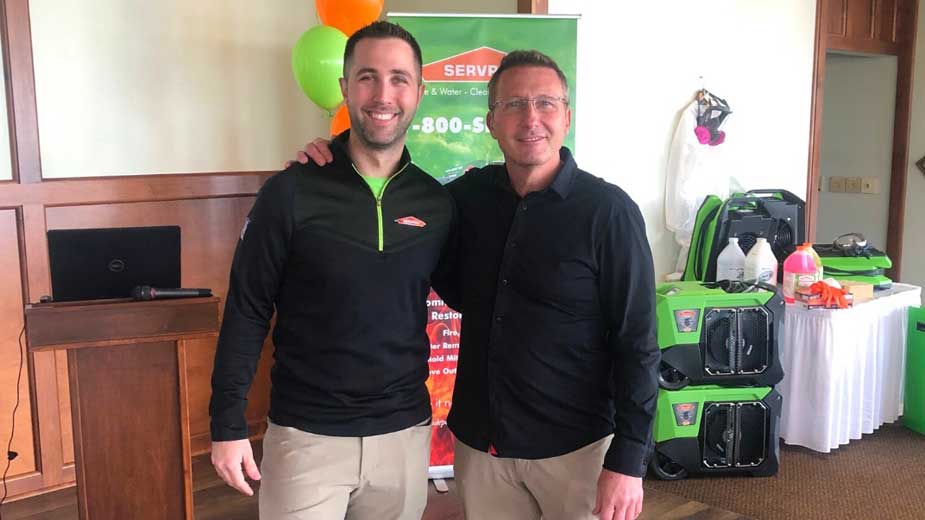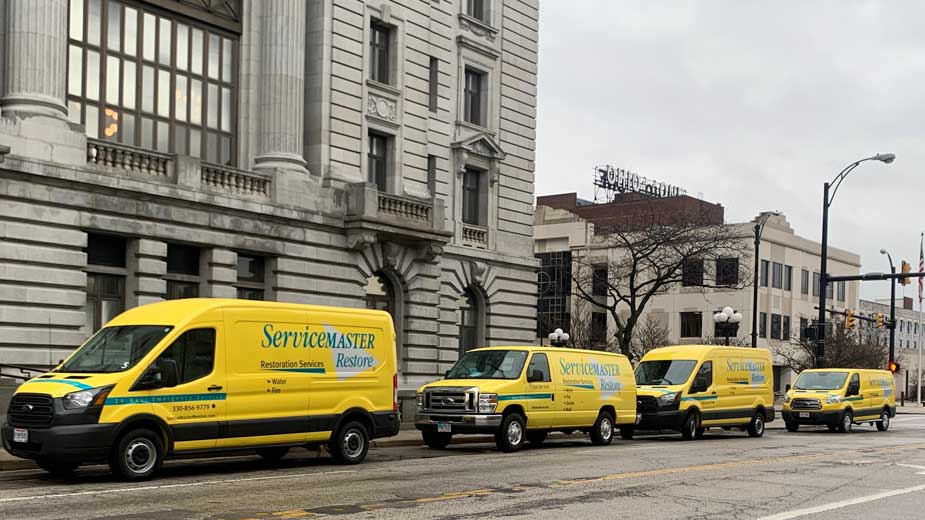Disinfecting Companies Clean Up Amid Virus Crisis
YOUNGSTOWN, Ohio – Companies that offer disinfection services for offices, factories and homes are reporting a surge in calls because of the COVID-19 outbreak.
It’s one of the few bustling industries amidst an economic crash brought on by the stay-at-home mandates.
Nationwide, job openings for cleaners are rising as companies battle the coronavirus, according to a report by MarketWatch.
Locally, disinfecting companies are in high gear although new hiring has not been necessary.
Disinfection is now at the forefront for two companies in the Mahoning Valley that specialize in cleaning and disaster damage. The local franchisees for national chains Servicemaster and Servpro say they are seeing a spike in cleaning and disinfection jobs.
Both companies have always offered infectious disease remediation but it had been a small percentage of their revenue.
Kevin Wyndham, managing partner of Servicemaster by Lewis Construction, headquartered in Warren, says 60% of his work in recent weeks is for disinfecting, up from the usual 10%.
Wyndham also owns Servicemaster branches in Boardman, Mentor and Akron and serves an area that extends from Pittsburgh to Cleveland.
With 75 to 80 employees across all four locations, Wyndham did not have to hire additional staff but instead mobilizes workers from his four offices to where the resources are needed on any given day.
The numbers are about the same at Servpro, which also has not had to add staff although it has occasionally hired temporary help.
Servpro staffers are “putting in long hours to get the job done,” said Jim Standohar, marketing manager.
Andrew Dobson, owner of the Mahoning-East and Mercer and Lawrence County, Pa., franchises of Servpro, said disinfection and cleaning calls have skyrocketed in the past month.
“We’ve had a massive uptick in volume,” Dobson said. “Typically, we do biohazard and infectious disease work at nursing homes, and it’s usually about 10% of our work. Just this month, it shot up to 50%.”
Dobson, of Warren, and his father, James, together own eight Servpro franchises, with a total of about 150 employees. Their other franchises are Mahoning-West, Southern Trumbull, Northern Trumbull-Ashtabula, West Erie County (Pa.) and East Erie and Warren Counties (Pa.).

“We’ve gotten countless calls,” Dobson said. “There are gas station-convenience stores where a staffer came down with coronavirus. We’ve also treated hair salons, doctor’s offices and police departments.”
According to Dobson, the COVID-19 virus is not particularly hard to kill outside the human body. “Measles is a hard one to kill,” he noted.
The task is more about containment and stopping the spread.
“The hardest part is containment, especially in public buildings,” Dobson said. “If there has been exposure, can you contain it to a wing or a specific area and minimize cross-contamination?”
A project begins with controlling the atmosphere – purifying and sanitizing the air before workers go in. “Even though we have proper protective equipment the goal is to minimize exposure to our workers, so we set up ventilators and air scrubbers,” he said.
Next comes cleaning and an initial sanitization treatment using a disinfectant that has been proven to be effective on the virus, followed by a detailed cleaning with a detergent-based product.
“We clean everything eight feet high and down because the thought process is that eight feet is all the higher a person can touch,” said Dobson.
The primary mode of infection is from droplets traveling from person to person but the next most common means of infection is from the hands. That’s why common touch points – doorknobs, handrails, light switches, elevator buttons, etc. – get the most scrutiny.
“We place emphasis on high-touch areas and go over them several times,” Dobson said.
One commonly asked question is, How long can the COVID-19 virus live on an inanimate object such as a doorknob?
“Some say 24 hours, some say a week or two,” Dobson said.
“We are still learning so much about it, how it’s transmitted and how long it lives on a surface.”
While most of his customers are hiring Servpro for proactive cleaning, some of Dobson’s jobs are reactive in nature, which means that someone in the building has been sick with the virus.
In either case, all surfaces in a room have to first be cleaned before disinfectant is applied. Dobson said his crews heavily rely on Servproxide, a powerful disinfectant created by Servpro.
The recent outbreak of the novel coronavirus has been “challenging,” Dobson said. He noted that Servpro – which most commonly is called for water or fire damage or mold – has always had a plan in place for such an event.
“We are a disaster remediation company,” he said. “We are always preparing our fleet and our people for any kind of disaster, including an epidemic.”
There are some misconceptions in the field, Dobson said, one being the term “deep cleaning,” which he said is not a defined process or industry terminology. It’s a phrase that somehow worked its way into the virus vernacular, but has no history or definition.
“It’s just a phrase that people have gotten in their heads,” he said.
The insistence that electrostatic sprayers are required is another misconception. Such devices put an electrical charge into liquids, which makes them coat a surface better.
“I’ve been trying to debunk that,” Dobson said. “To get proper disinfection, you need to do three things: use the right kind of chemical, clean the surface before disinfection, and then have ample dwell time (the length of time the disinfectant remains on the surface). You apply disinfectant, do a detailed cleaning, then apply it again.”
Local Servicemaster franchisee Wyndham has also turned his attention to cleaning and disinfecting since the outbreak began.
“Usually, our calls are for mold cleanups and water backups, and fire damage or smoke, and not usually disinfecting,” he says. “We do biohazards as a regular service, so we have the products, the training and the personal protective equipment for these circumstances but we’re not used to doing it every single day. More like a couple of times a month.”
The biohazard and disinfecting jobs he typically handles are often the result of a death, suicide or trauma where there was a body (at the site) for an extended period of time and bodily fluids are present, or for an office where an employee had a contagious disease.
Servicemaster’s current spate of disinfection jobs have largely been in stores, offices and light manufacturing buildings.
“Very few [of our COVID-19] calls are from medical locations,” Wyndham said. “Dentists are shut down right now, and specialty doctors are seeing very few patients. So we’re not getting those. It’s more from places that are continuing to do business, such as retail stores where business is ongoing and they’ve had an exposure or an employee is suspected of having it. Some places are just doing preventive cleaning to put their best foot forward.”
Some of his contracts are ongoing, with cleanings done at regular intervals; other customers just call back when they want a repeat cleaning.
Wyndham’s crews are doing weekly disinfecting at both the Mahoning County Courthouse and Administration Building.
“We’ll do a preventive baseline cleaning, and then they keep all of their [anti-virus] measures in place.”
When it comes to fighting coronavirus, Wyndham strictly adheres to the Centers for Disease Control and Prevention guidelines.
“You can’t be experimental at this time,” he said. “The CDC is specific about what they want.”
Wyndham said “fly-by-night companies” are popping up and just doing spraying. “The CDC is specific that you do cleaning first before spraying,” he said, noting the CDC has a list of acceptable, and non-acceptable, disinfecting products, and constantly updates it.
“There are different brand names, but there is a family of active ingredients that must be in the product,” he said.
The application of each disinfectant must also be done according to CDC instructions.
“Whether it’s poured, wiped or sprayed on, not every product is approved to be used in every way,” Wyndham said. “They also can have different dwell times, which are usually between two and 10 minutes.”
Pictured at top: Servicemaster trucks parked in front of the Mahoning County Courthouse downtown. Servicemaster has a contract to disinfect the building.
Copyright 2024 The Business Journal, Youngstown, Ohio.



